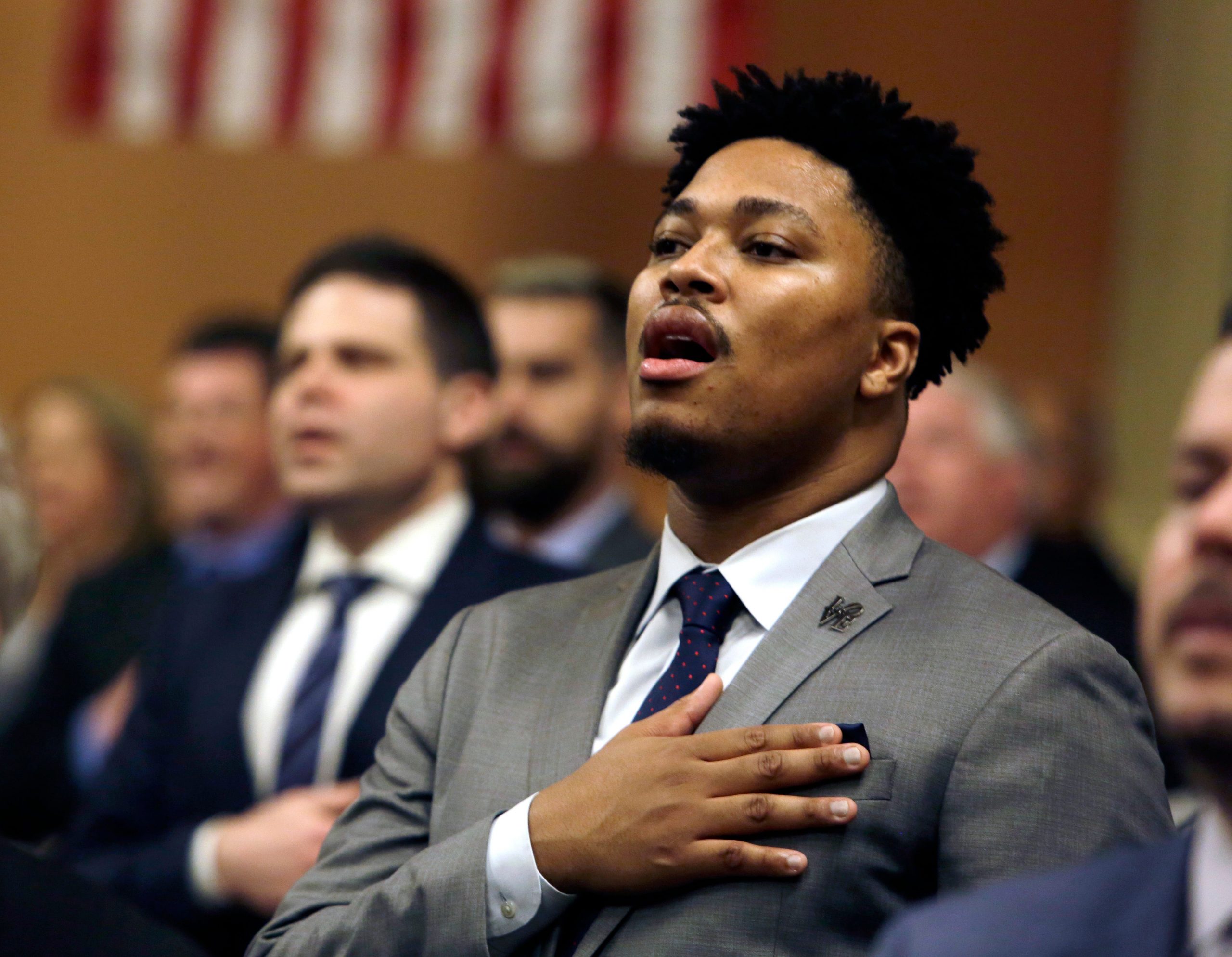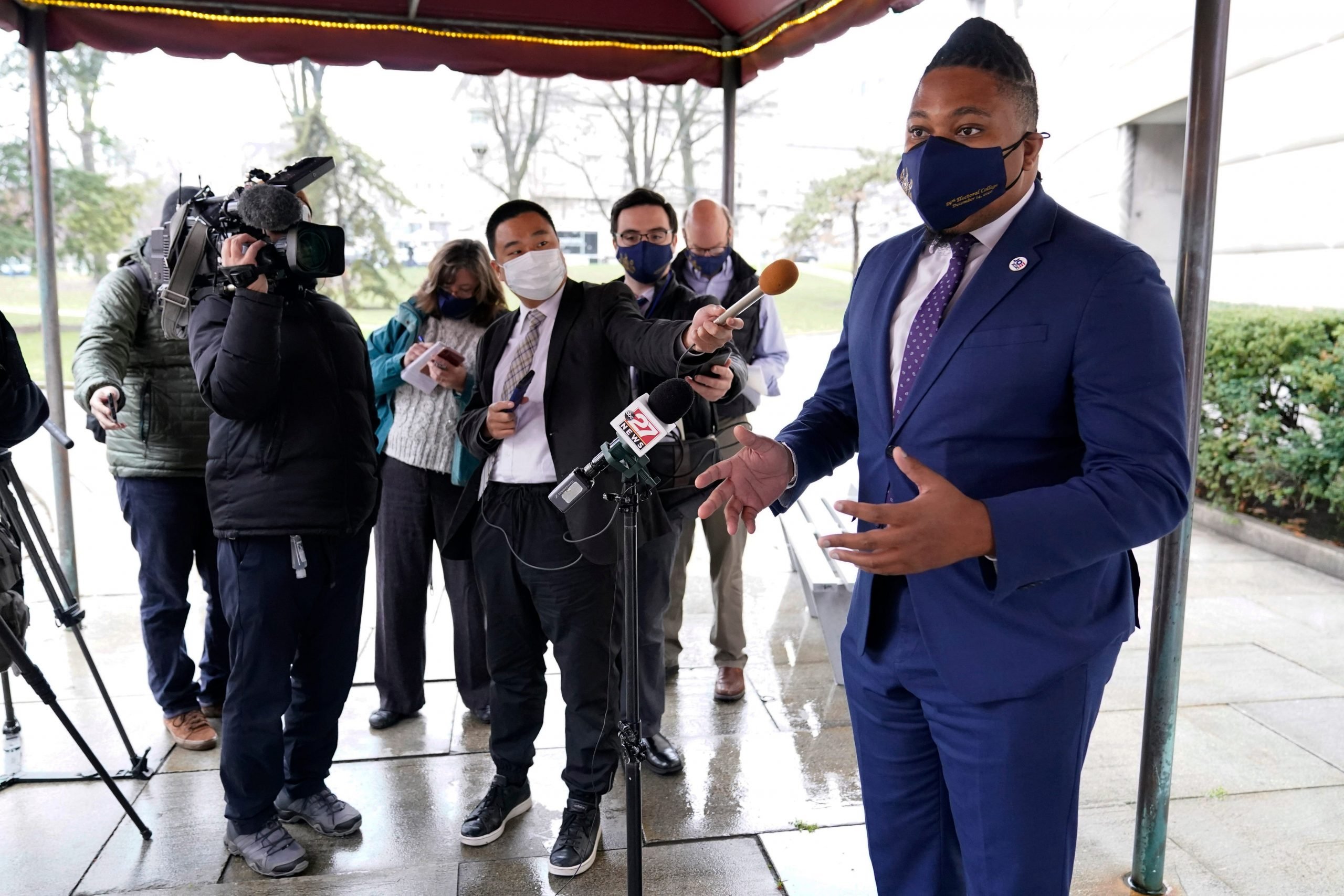
AP Photo/Jacqueline Larma
- State Rep. Malcolm Kenyatta has joined the 2022 Pennsylvania US Senate race.
- Kenyatta, a 30-year-old progressive lawmaker, is a community activist from Philadelphia.
- “My story certainly has a lot of distinct parts that are unique to me, but not that unique to most Pennsylvanians,” he said.
- Visit the Business section of Insider for more stories.
When Pennsylvania state Rep. Malcolm Kenyatta was a 12-year-old growing up in North Philadelphia, he got a job washing dishes at a restaurant to help his mother pay the bills.
Kenyatta describes his upbringing as “working poor,” with a keen understanding of the economic challenges that have left many families behind, from static wages to housing affordability.
“My story certainly has a lot of distinct parts that are unique to me, but not that unique to most Pennsylvanians,” he said.
In 2018, Kenyatta, a community activist, was elected to the Pennsylvania House of Representatives, becoming the first openly gay Black state legislator and one of the youngest members of the legislature.
Since being elected, he has pushed for an expansion of early voting statewide and worked to reduce homelessness in his North Philadelphia-anchored district, among other issues.
Last month, Kenyatta, 30, announced that he would be running for the Senate seat being vacated by two-term GOP Sen. Pat Toomey in 2022, in what will be one of the most competitive races in the country.
He will face Pennsylvania Lt. Gov. John Fetterman in a Democratic primary that will likely attract other high-profile candidates in the coming months.
Kenyatta recently spoke with Insider about his campaign. Below are edited excerpts from that interview.
Q. What inspired you to run for the Senate at this really critical time in our nation's history?
A. Every generation has a responsibility to work to preserve and expand the promise of America - and that's been a promise that has excluded a lot of people over time, but something we've always worked to broaden. Look at the compounding crises that have been more exacerbated as a result of COVID-19.
If you're a working person, there were issues with housing prior to this cruel pandemic. There were issues with education. There were issues with wages. There were issues with being able to start a small business. What we need in this moment are people who understand what's broken and can take us from where we are to where we need to go.
What legislative priorities have you been able to promote as a Democratic lawmaker in a GOP-controlled House?
Defense wins football games. It's a big part of what we've had to do in not having the political math in our favor. One of the things we've had to do was stop some of the worst things. I've been on the front line of that, particularly as it related to protecting everybody's votes.
I was able to build a big coalition against an "election integrity" committee that would have allowed that allowed the Republican majority to impound voting machines and physically compel election officials to come testify before sham hearings, while they were supposed to be counting every vote. Stopping that became a national story.

AP Photo/Matt Slocum
If elected to the Senate, what would be your three biggest priorities in office?
The first is mental health care for the young. This pandemic has stolen a lot in terms of lives and livelihoods, but it's also stolen the ability for our young people to engage. Their lives have been turned upside down. I introduced a bill with a Republican colleague called Phillip's Law that will help us completely reimagine the way we provide mental health care in our schools.
The second issue is dealing with deep poverty, which is the moral and economic issue of our generation.
The final thing we have to do is create hundreds of thousands of good-paying jobs in clean energy.
You're not taking money from corporate PACs. In the 2020 election cycle, over $2 billion was spent on the most competitive Senate races. Should there be campaign finance reform?
The problem with our system is the incredible amount of money that it takes to run. We're going to raise money, but not with folks who have armies of lobbyists already. It has to be a movement of people who understand that working people haven't been centered in our policy discussions. They're going to be the ones with small-dollar donations.
We need to have a serious conversation about getting rid of Citizens United [vs. Federal Election Commission], which was one of the worst decisions to ever be handed down by the Supreme Court.
President Joe Biden favors canceling $10,000 in student loan debt per borrower, but has ruled out forgiving up to $50,000 in loans per borrower through execution action. What do you think should be done?
Canceling student loan debt is something that not only helps borrowers, but it helps our economy as we think about how to recover from the impact of the pandemic. We've been racking up a lot of debt because we haven't dealt with college affordability. We haven't looked at ways to make college free, which it ought to be in most instances. Getting rid of $50,000 and then even going beyond that is one of the ways that we can have robust stimulus in our economy.
What do you think your candidacy means for so many people who may not have seen themselves represented in government before?
I had a friend who called me the day after I announced and said she let her daughter stay up to watch my announcement. Her daughter said the next day - "Mommy, I can't wait until I run for President, and Malcolm can advise my campaign." There so many young people who are paying more attention than we give them credit for. They see candidates who represent the fullness of the American experience.
I know what it's like to get an eviction notice. I know what it's like for people who are worried about their electric and gas bills. They're not academic exercises for me. This is my life. This is the life of the people I know and love.